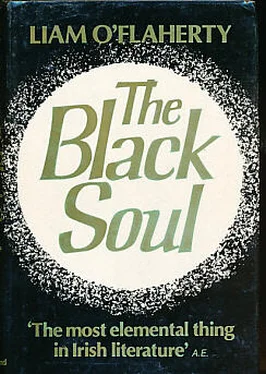He walked down to the brink of the Reef, gripping the seaweed with his feet. He stood on the brink looking out into the sea. The thought of suicide came to him now seriously, as the result of the hopelessness of thought. It came not from the brain, but from the heart that could not find anything to love or reverence. It permeated his whole body, without touching his brain. His brain seemed to stand aside, indifferent. Down below him the sea waited, luring him. Behind him lay the world repelling him. It appeared to be full of strange shapes, and each shape was trying to grasp him. He could not possibly escape from those shapes other than by plunging into the sea. And yet they were all illusory. That was the worst of it. If he could only catch them and argue with them he would have no fear. But they were monstrous and intangible. There was nothing real in the cavern of his experiences. Life had been a nightmare. Now, presently, when he disappeared beneath the waves, he would awake in the reality of death.
There in front was forgetfulness. He began to bend his body forward from the hips to plunge, but as soon as he tried to move, his brain became active. He straightened himself again and his toes itched with fear. ‘I wonder what it is like?’ he said, assuming a tragic posture. He clasped his hands across his breast and looked out wildly. His nostrils dilated: his forehead furrowed. He was seized with such a terror of the sea and of death that he could not even scream. The sea seemed to draw him down towards its bosom. He wanted to fly, but he was numb with fright. Then his anger swelled against it. It was a siren trying to lure him, an accursed siren that devoured men and ships ravenously, a ravisher that sucked into its lustful bowels toothless old hags and beautiful young women indiscriminately, a mad giant that devours its own offspring the earth. The eternal motion of it awed him. He wanted to strike it. But where could he strike it? Where was its heart? Where its bowels? Where its head? It was the same everywhere. It resisted nowhere to the touch, like a vast mass of protoplasm. It was so confident of its power that it opened every pore of its vast face, and ships, rocks and whole continents could sink into it down to its inmost depths, and yet it moved on sardonically. It always moved. It moved. It moved. It moved. ‘Stop,’ he cried suddenly, ‘stop, sea!’ He had stretched out his hands, but they fell back again by his sides, as the sea took no notice of him. And he felt particles of the salt air clinging to the insides of his lips, and an empty feeling at the roof of his mouth, caused by the hunger-inspiring smell of the sea.
Hunger drove away his anger and his desire for death. How could he die while the sea moved that way, taking no notice of him? There was nobody to take any notice of him. The world would never hear of him. Then why die if the world never heard of his death? It would be no revenge on the world. It would be different if he shot himself with a revolver in O’Connell Street in Dublin. But even then he would be forgotten in a week, especially in that city where a dog-fight is more interesting than a score of suicides or murders. Even Little Mary would forget him and embrace the next man she met who aroused her passion, just as he had seen the crabs do. Ah! There was nothing eternal but the sea. ‘Ah, beautiful fierce sea,’ he cried aloud, as if he were speaking to a mistress, ‘you are immortal. You have real life, unchanging life.’ And just as one morning in Canada when he had seen the reflection of a vast pine forest at dawn in the eastern sky, he had stood in awe, his imagination staggered, thinking that a new world had suddenly been born before his eyes, so now, looking at the sea, the meaning of life suddenly flickered across his mind. It flashed and then vanished, leaving wonder and awe behind it.
He sat down, looking at the sea. His eyes roamed out over it, from the hollows beneath him by the jagged Reef, southwards along its glistening back beneath the Hill of Fate, then westwards where it grew bluer and vaster with silvery streaks of sunlight on it, until it joined the pale rim of the sky. He looked back again to his feet. He could see tiny ridges on every patch of water, like the muscles on the body of a giant, who was doing an eternal task, for ever without purpose. ‘Oh, to have strength like the sea,’ he thought. ‘Just to go on fearlessly until one dropped. To be ruthless. Damn conscience, honour, everything! Nothing is worth while but ruthless strength. Happiness is for the strong. I wonder did anybody ever say that?’ And he jumped to his feet.
He turned his back to the sea and kicked at the seaweed that grew at his feet on the rock. A starfish skidded from his foot and fell on its back on a little bunch of yellow moss. A piece of periwinkle-shell fell on top of it, in the centre where its four legs joined. It looked so funny and helpless that he had to laugh. It was like a compass with millions of little whitish legs sticking from its surface. It lay still for a moment, stunned by the fall. Then the little legs began to bend towards the piece of periwinkle. They gripped it. Their movement was as slow and calculated as that of hired labourers working in a State factory. Then the periwinkle began to move. The little legs appeared so minute and futile that the periwinkle seemed to crawl of its own accord. The legs, like ants, were passing it from one to another. Scores of them united to move it an eighth of an inch. At last they brought it to the brink of a leg, and a hundred or so gave it a final push over the side. It lay still immediately, like a vast rock heaved on a level plain by a thousand men. Then the legs lay still again. ‘Just so the Egyptians built the Pyramids,’ he mused. ‘Shivering, senseless life! Men, starfish, crabs, motion without purpose. But it is motion. Nothing wants to die. It is cowardly to want to die.’ He pushed the starfish back into the pool with his foot and walked up the shore, elated and gloomy. For the life of him now he could not understand why he wanted to die. But of course his scheme of values had been all wrong. It was clear to him now that the only real thing in the universe was life itself, the act of living. Nothing else mattered. No particular expression of life was important, but life itself. All expressions of life were transitional and ephemeral, like the starfish fighting the periwinkle, or the embrace of the crabfish, or the building of the Pyramids, or the death of Christ, or the conquest of Gaul by Caesar. The struggle of the Greeks against the Persians at Marathon was of no more importance to life than the struggle of the starfish against the periwinkle. The expression of life was important only to the individual since … ‘Oh, that’s all rot,’ he cried, snapping his fingers, just at the climax of his chain of reasoning. ‘What’s the matter with me? I feel fit. The sun shines. Why worry about the world? Eh? The world is all right.’
He began to swing his arms as he reached the sun-baked, flat limestone crags above the wet shore. He struck the ground fiercely with the sole of his hard rawhide shoes. It was a pleasure even to tread the earth in his exuberant joy at having conquered his melancholy and being satisfied with life again. Then he thought of Little Mary and stopped short. ‘I want her,’ he thought, ‘but how am I going to get her? There’s Red John.’ A snail was crawling across a dried-up shallow pool in the crag at his feet. It left a shiny trail on the spongy black bladders that grew on the black mud at the bottom of the pool. He smiled, looking at the snail. ‘Yes, to hell with the yokel,’ he said, walking on. ‘Why should I let a miserable peasant stand in my way? A strong man would let nothing stand in his way.’ Yet Red John still troubled him. He remembered now having seen Red John look at him a few mornings ago with murder in his eyes. He had paid no heed to it at the time, but now he remembered with a shudder that it was a cunning murderous look, the look of a madman.
Читать дальше












